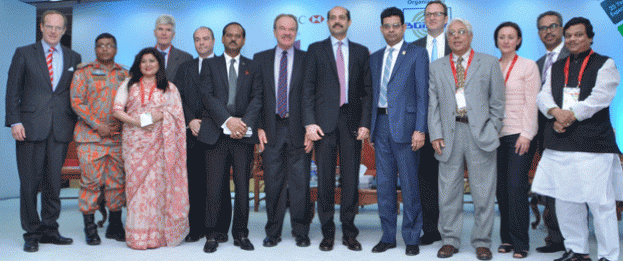


December 08, 2014
Future of Workers Workplace Safety and Sustainable Production
(Dhaka,8 December 2014) Dhaka Apparel Summit, first of its kind in Bangladesh, is being held at the Bangabandhu International Conference Center on 7-9 December 2014. The summit was organized by Bangladesh Garment Manufacturers and Exporters Association (BGMEA) in collaboration with Brand Forum Bangladesh.
Press Release- Session 4
The 4th session of the Dhaka Apparel Summit titled “Future of Workers: Workplace Safety and Sustainable Production” was held at Bangabandhu International Conference Center (BICC) in Dhaka on 8 December.
This session focused on the perspective of purpose-built manufacturing in a modern era. The session also shed light on progresses made since the inspection initiatives, i.e. NTAP, Accord & Alliance, started working. The discussion also covered workers’ rights issues, policy and capacity of the government and private stakeholders, donors support, engagement of the diplomatic community and brands.
Opinions:
Ian Spaulding, Senior Partner – ELEVATE, said that remediation of factories is a complex part and it will take years to complete it.
Brad Loewen, Chief Safety Inspector, Accord on Fire and Building Safety in Bangladesh, said that the more we bring and transfer knowledge to Bangladesh it will help the industry.
Brig Gen Ali Ahmed Khan, Director General of Fire Service and Civil Defence, said that lack of fire stations in industrial areas, narrow roads are some of the challenges we are facing. It is necessary to have a fire service station in an area from where fire fighters can reach the spot within 10 minutes.
Dr. Ferdinand von Weyhe, Chargé d´Affaires, Embassy of Germany to Bangladesh, said consumers always ask us to support the RMG sector and help and build the capacity to make the products more sustainable in terms of environmental issues which is also a great concern for the German government.
Anisur Rahman Sinha, Former President, BGMEA, said that Rana Plaza has opened our eyes. Resilient entrepreneurs, management and workers the success of the RMG sector could not be made, he added. “Problems are everywhere. Problems have to face professionally. Bangladesh will face all the problems very confidently and succeed”, he opined.
Recommendations:
Ian Spaulding, Senior Partner – ELEVATE, said that besides inspection, remediation and training, it is necessary to change the mindset of factory owners about safety. Now our focus is on training. We also focus on building capacity of workers’ representatives, supervisors and managers so that they can continue training themselves and others.
Brad Loewen, Chief Safety Inspector, Accord on Fire and Building Safety in Bangladesh, it is necessary to build the capacity of government agencies, RAJUK, IEB, IAB who are the key parts of the policy and design world.
Tuomo Poutiainen, Programme Manager, Ready Made Garment Sector, ILO-Dhaka, said that from ILO perspective education and knowledge is important for capacity building of government, regulatory agencies, young entrepreneurs, workers and young professionals, which are key to sustain safety initiatives in longer terms.
Z M Kamrul Anam, President, Bangladesh Textile & Garment Workers League (BTGWL); Coordinator, Textile Group, IndustriALL Bangladesh Council (IBC), as per the ILO convention ratified by Bangladesh workers have the right to organize and bargain, this is equally important for the management to have a worker representative to discuss on arising issues. Trade unions and workers have their rights and responsibilities as well.
Farzana Chowdhury, Managing Director & Chief Executive Officer, Green Delta Insurance Company Limited, said that insurance companies can work strategically with RMG owners on building awareness of the workers by road show in the industrial areas, cultural shows etc.
Brig Gen Ali Ahmed Khan, Director General of Fire Service and Civil Defence, said that training is going on but this is not enough since training a continuous process. For quick response in case of disaster in the industrial zones like Gazipur, Savar, Narayanganj it is necessary to have additional five to six fire stations to reduce the risk of disaster. While building a factory it is necessary to keep space for fire engine.
Debbie Coulter, Head of Programmes, Joint ETI (Ethical Trading Initiative), said that there is an increasing demand from buyers that you are having social dialogue with workers. She also laid importance on harmonious relationship between workers and management.
US Ambassador to Bangladesh Dan W Mozena, said that there must have some mechanism through which workers and management can resolve their issues. He laid emphasis on branding Bangladesh as a preferred brand and number one brand in the world.
Reaz Bin Mahmood, Vice President (Finance), BGMEA, moderated the session.
US Ambassador to Bangladesh Dan W Mozena, Dr. Ferdinand von Weyhe, Chargé d´Affaires, Embassy of Germany to Bangladesh, Anisur Rahman Sinha, Former President, BGMEA, Debbie Coulter, Head of Programmes, Joint ETI (Ethical Trading Initiative), Brad Loewen, Chief Safety Inspector, Accord on Fire and Building Safety in Bangladesh, Ian Spaulding, Senior Partner – ELEVATE, Tuomo Poutiainen, Programme Manager, Ready Made Garment Sector, ILO-Dhaka, Brig Gen Ali Ahmed Khan, Director General of Fire Service and Civil Defence, and Farzana Chowdhury, Managing Director & Chief Executive Officer, Green Delta Insurance Company Limited, Z M Kamrul Anam, President, Bangladesh Textile & Garment Workers League (BTGWL); Coordinator, Textile Group, IndustriALL Bangladesh Council (IBC, took part in the session as panel speakers.

Copyright © 2020, The Bangladesh Garment Manufacturers and Exporters Association.
Version-2.0, Design & Developed by Systech Digital Limited.
Version-2.0, Design & Developed by Systech Digital Limited.
